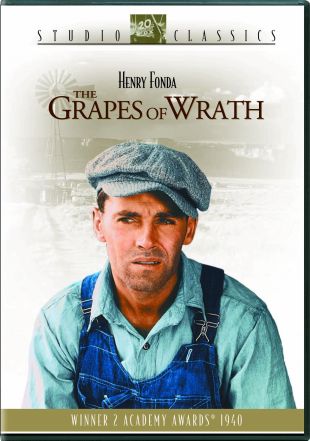
John Ford's The Grapes of Wrath is arguably the director's greatest movie, and the rare Hollywood film superior to its literary source (a view shared by the novel's author, John Steinbeck). Indeed, it is the movie that sums up the impact of the Great Depression, at least on rural America, better than any other film of its time (and there were hundreds that tried, by everyone from Frank Capra to Preston Sturges). From the opening shot of Tom Joad's return to the ruined land where he grew up, the movie is a study of people whose dreams and hopes wither away like the drought-stricken crops. Yet Ford managed to make a movie that wasn't utterly pessimistic, despite its story and setting: the performers and script availed him of indomitable characters, convincingly portrayed, with the result that even the most cynical viewers were persuaded of Ford's artistic vision. Henry Fonda, who'd been an up-and-coming leading man, solidified his image as an upright hero with an almost mystical bent in his portrayal of Tom Joad; Jane Darwell became the archetypal rural matriarch; and even the bit players, such as Ward Bond and Grant Mitchell, got relatively rare opportunities to play against their usual types as beneficent characters. The movie became a strange case of fiction transcending fact, as Ford's images (photographed by the great cinematographer Gregg Toland) became more representative of the period than most documentary photography. Countless filmmakers have quoted from The Grapes of Wrath (there's a very funny audio-visual reference in Close Encounters of the Third Kind), and Ford himself never made a more compelling social statement despite several attempts (The Sun Shines Bright, Sergeant Rutledge, and others) over the next 20 years.
